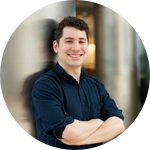About This Project
Addressing climate change requires new approaches for fixation of CO2. Inspired by nature, Rubisco, the central enzyme of photosynthesis, may offer a route for reducing CO2. However, efforts are limited by the efficiency and specificity of Rubisco, with difficulties for both rational and directed evolution engineering approaches. We will engineer Rubisco via machine-learning assisted directed evolution, allowing for rapid generation of new variants suitable for broad-scale carbon capture.
Ask the Scientists
Join The DiscussionWhat is the context of this research?
No response yet. Add response
What is the significance of this project?
No response yet. Add response
What are the goals of the project?
No response yet. Add response
Meet the Team
Jonathan Gootenberg
Jonathan Gootenberg is a McGovern Institute Fellow and co-PI of the Abudayyeh-Gootenberg lab at Dr. Gootenberg draws from fundamental biological insights to engineer new molecular toos, including CRISPR-mediated genome and transcriptome perturbation and non-destructive cellular sensing. These technologies allow for unprecedented manipulation and profiling of cellular states in the body, have multiple applications in basic science, diagnostics, and therapeutics, and have been translated into multiple biotechnology companies, including 5 companies that Dr. Gootenberg has co-founded. Dr. Gootenberg earned his bachelor’s degree in mathematics and biological engineering at MIT and received his PhD in Systems Biology from Harvard University, during which he conducted research with Aviv Regev and Feng Zhang at the McGovern Institute and Broad Institute of MIT and Harvard. His work on genome editing, protein design, and diagnostics has resulted in over 50 publications with over 35,000 citations. He has been recognized with awards including Forbes 30 under 30, Technology Review 35 under 35, Business Insider 30 and under, Endpoints 20 under 40, and as an inaugural Termeer Foundation scholar.
Project Backers
- 0Backers
- 0%Funded
- $0Total Donations
- $0Average Donation
